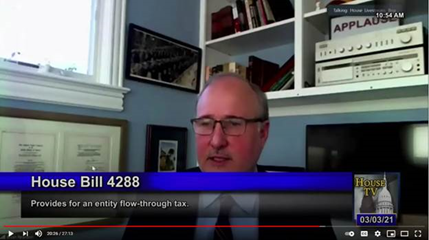S Corporation Association President Brian Reardon testified this week – via Zoom – before the Michigan House of Representatives’ Tax Policy Committee. The subject of the hearing was H.B. 4288, which would permit electing pass-through businesses to pay their state and local tax (SALT) at the entity level, thus enabling them to fully deduct these expenses on their federal returns. Click the screenshot below for a video of Brian’s testimony:
Brian kicked off his testimony with a presentation (available here) on how Michigan taxpayers would benefit from enactment of H.B. 4288. He highlighted the fact that nearly 250,000 Michigan pass-through entities are currently paying higher taxes as a result of the SALT cap and walked through the mechanics of the SALT Parity bill which make it revenue neutral to the state. According to previous analysis, Michigan pass-through businesses would save $190 million a year on their federal taxes, all at no cost to the state.
He also addressed the bill’s accompanying fiscal note, published by the Michigan House Fiscal Agency, which projected that implementation of H.B. 4288 would cost $8 to $10 million. Brian countered by offering real-world data from other states that have enacted SALT Parity reforms, including Maryland and Oklahoma, who have seen significantly lower implementation costs.
Some may remember that Michigan passed SALT Parity legislation back in 2018, but then-Governor Rick Synder vetoed the legislation in his last days in office, based on uncertainty about whether the IRS would strike down our approach. Now that the IRS has instead blessed SALT Parity, the state is making another run at the legislation. If the initial bill had been adopted in 2018, Michigan businesses could have kept nearly $600 million over the last three years, money that instead was sent to Washington.
With the effects of COVID continuing to negatively affect businesses, it is time for Michigan and all the other pass-through states to adopt SALT Parity and help their Main Street businesses.

